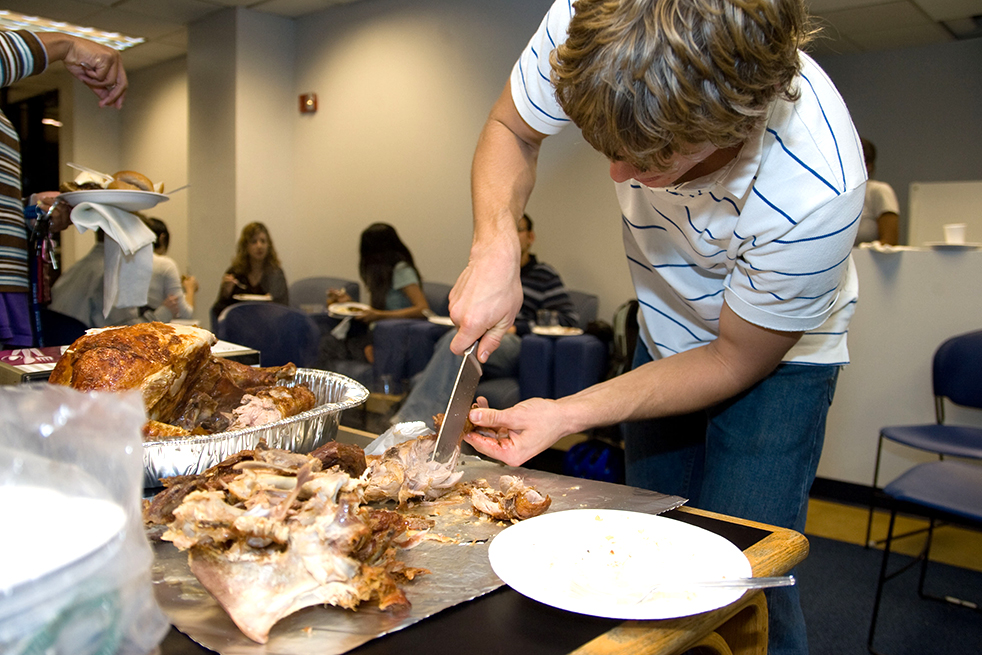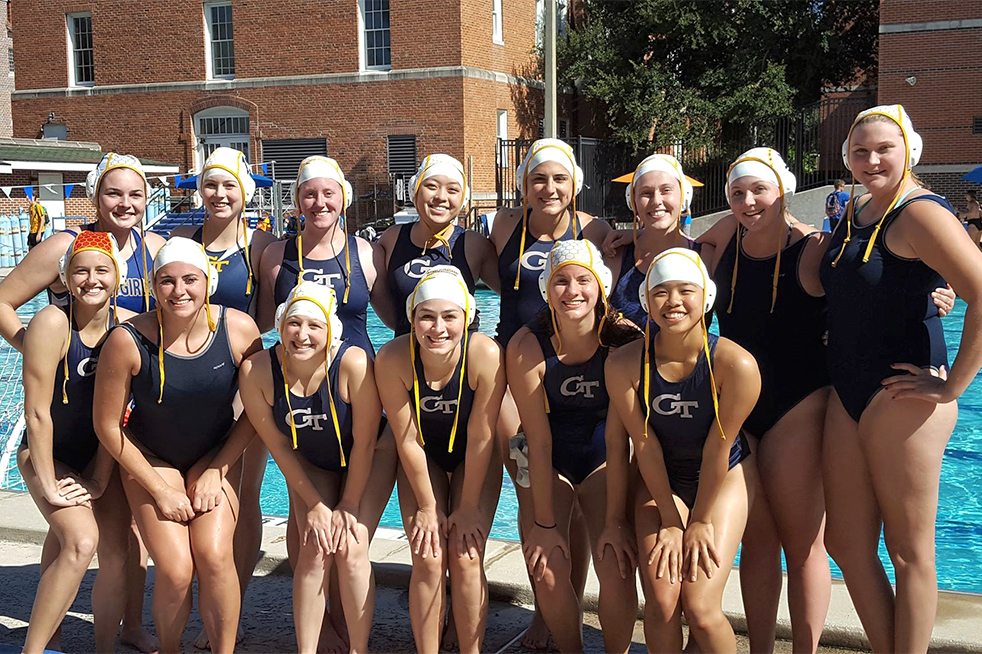
At Tech, student-athletes are students first.
Their grades are not inflated, they are held to higher standards, and they do have plans for post-graduation life.
The Technique headed to the Edge building next to Bobby Dodd Stadium to speak with the Georgia Tech Athletic Association (GTAA) and student-athletes themselves to address these myths and misconceptions.
NCAA Compliance
To maintain eligibility as a student-athlete (SA), certain GPA and degree requirements must be met. These are set by the National Collegiate Athletic Association (NCAA) and, therefore, must be followed across the country.
NCAA compliance for Division I schools has strict guidelines. In addition to needing a higher minimum GPA at the end of freshman year than non-athletes, SAs must also fulfill “progress toward degree” requirements.
At least six degree-applicable hours must be taken each semester, 18 each academic year, and SAs must be full-time students. Rising third-years must be at least 40 percent done their degree, fourth-years 60 percent and fifth-years 80 percent.
The current progress toward degree requirements were added in 2003. Previously, recruiters at many schools brought athletes in knowing full well that they would not complete their degrees.
As a result, the NCAA created the graduation success rate (GSR) and academic progress rate (APR) metrics in 2002 and 2003.
GSR is the six-year graduation rate. The latest data from 2008 shows that the freshman class of 2008 had a higher GSR than Tech’s overall graduation rate.
APR is a more timely measure of SAs’ progression toward their degrees. Four Tech teams have APRs in the top 10 percent across the NCAA in their respective sports, according to Chris Breen, assistant athletic director (AD) for student services.
Staying academically compliant is hard enough, but GTAA provides ample support to ensure the success of their SAs.
Support Structure
Instead of trying to internally offer all the support SAs could need, GTAA works with their “key liaisons” across campus. C2D2, the Language Institute and others offer their services to the SAs. These are services offered to all students, but GTAA heavily promotes its on-campus partners.
“If we attempted to do all, that would be the travesty of what may go on in athletics, and we’re not about that,” said Phyllis LaBaw, associate AD for Student Services.
A primary service that GTAA itself does provide is tutoring.
“The amount of [tutoring] requests from our student-athletes is growing,” said Michael Woo, assistant AD of tutoring.
In addition to the Hearn Academic Center on the third floor of Edge, tutoring also occurs in the Tech Center, meeting rooms, the Edge dining hall and the conference room — up to 16 appointments at any one time.
“We’re trying to figure out creative ways on how to build upon our current space,” Woo said.
GTAA relies on its experienced staff to provide graduation plans and academic support, all dependent on each individual student’s needs. This staff helps SAs plan their class progression, schedule travel and makeup work with professors and seek the on-campus resources they need to succeed.
In addition to academics, GTAA also provides more holistic support for its SAs.
TPP: Pipeline for Success
The Total Person Program (TPP) is Tech’s way of making student-athletes more well-rounded and prepared for their futures. The program was originally implemented by Homer Rice, athletic director from 1980–1997, and serves as the model for similar programs across NCAA universities. The Homer Rice Center for Sports Performance, home to TPP, also resides in the Edge building.
TPP is divided into six categories: health and wellness and nutrition, leadership development, community service, personal growth and development, spiritual growth and career planning.
Leah Thomas*, nutritionist and director of TPP, works with Sodexo and Sysco to coordinate meals and snacks in the Edge dining hall and Nutrition Center.
Beyond her role as a nutritionist, though, Thomas fulfills the latter five tenets of TPP by hosting presentations, workshops, trainings and guest speakers. These include finance 101, sexual violence prevention and a small-scale career fair. SAs are provided help with resumes, business cards and career planning in conjunction with C2D2 and the Comm Lab. Many do community service with Girls on the Run, Special Olympics and others.
One event is mandatory for all SAs to attend each year. The rest are mandatory for specific groups: freshmen must take sexual violence prevention training; upperclassmen must attend the SA-only career fair.
The point of it all, according to Thomas, is to make SAs “feel like they’ve been prepared for life, … to leave here prepared for anything and to feel supported.
“Those who [choose] to not just be a part of it but to actually engage, participate and get something out of it will leave here feeling like [TPP] did a lot for them.”
What do the SAs have to say?
Student-Athlete Speak
Sam Pierannunzi*, fourth-year BA and centerfielder for softball, was able to get a minor in Spanish and even study abroad in Spain over the summer while leading the team in runs and bases stolen.
Pierannunzi is currently deciding between graduate school and pursuing connections made at the SA career fair.
“There’s everything you could ever need. … They help you in every way, shape, and form. It’s pretty incredible,” Pierannunzi said.
Andrea Demick*, fourth-year BA and co-captain of the diving team, recently set a personal best in the 3-meter dive and is secretary of the Student-Athlete Advisory Board.
Demick is going to law school and used the LSAT prep that GTAA offers in partnership with NCAA and Kaplan.
“[TPP] proves that the Athletic Association and the school as a whole care more about just us being athletes. It proves they care about us as individuals after Georgia Tech and when we graduate,” Demick said.
Teegan Van Gunst*, fourth-year ME and outside hitter for volleyball, leads the team in kills and maintains an impressive GPA.
Van Gunst wants to keep playing volleyball after graduating, whether that means getting a Masters degree while playing sand volleyball or going overseas to play in an indoor league.
“[Thomas’] wisdom and the people she brings in help us out give us a bigger worldview, a bigger picture of what we’re doing now and the struggles we’re going through now and how we can use them … to propel us into the workplace and wherever our careers take us,” Van Gunst said.
Jonathan King*, fifth-year IE (redshirt senior) and left-handed pitcher for baseball, was a key starter in 2015, pitching the most innings on the team, before an injury early in the 2016 season.
TPP has helped King decide that he wants to eventually move into coaching after graduating.
“I think that the Total Person Program and some of the speakers that have come and spoken to us have really taught me and helped me to understand that it’s almost wrong for me to not pursue something that I feel like I should do,” King said.
Concluding Remarks
Student-athletes are an integral part of Tech, but many others feel disconnected from them and the affairs of GTAA. This has led to pervasive myths and misconceptions about student-athlete academic performance and professional development.
Some of the inner workings of the association have been explained here. Many were left out. These and more will be expanded upon in further articles.
As the Technique and GTAA continue to demystify athletics to the general Tech community, hopefully the community discards its preconceived notions and comes to appreciate these hard-working individuals and the effort that Tech and GTAA puts into their continued success.
*Full-length interviews are linked.









